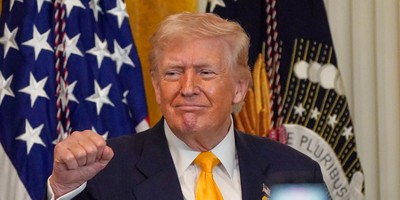It seems as though many on the Left have a complicated relationship with the concept of tolerance. On one hand, it's a sacrosanct liberal value, giving rise to the impulse to plaster 'Coexist' bumper stickers on Toyota Priuses from coast to coast (message to fellow motorists: I'm a good person). On the other hand, the tolerance brigades often grant themselves sweeping dispensation when it comes to the toleration of any thoughts, words, or deeds deemed to be intolerable. Such intolerable Crimes Against Tolerance can include everything from genuinely abhorrent bigotry to prosaic disagreements over mainstream political issues. For too many closed-minded, coercion-minded liberals, the stream of tolerance and coexistence only flows in one direction. Everyone is entitled to my opinion. When Mary Katharine Ham and I wrote End of Discussion -- which was published just days before Donald Trump announced his presidential campaign last summer -- we opened our very first chapter by painting a vignette of someone debating whether or not to post his opinion about a political controversy on Facebook. This person had a firm opinion on the firestorm du jour, but worried that airing it in public could inflame friends, family or colleagues who'd inevitably disagree -- the fallout from which could spill over into interpersonal relationships, or even the workplace. In our hypothetical example, the conflicted party decides to keep his thoughts to himself, determining that weighing in just isn't worth it.
One of the underlying premises of our book is that while both sides indulge in corrosive, motive-impugning shaming and debate-stifling political correctness, the problem is more pronounced and ingrained on the Left, for a number of reasons. One of the ironies we highlight is that so many of the people who fancy themselves the most open-minded and tolerant members of our society actually possess unusually low 'disagreement thresholds.' They're unable to empathize with, or even countenance, people who adhere to opposing worldviews. Left-leaning academic Jonathan Haidt has written and spoken extensively about these ideological blind spots that disproportionately affect liberals. We also cited a phenomenon in End of Discussion identified by the Pew Research Center as the "spiral of silence," which revealed how people are reticent to openly share views that may subject them to "ostracism, ridicule and bullying" online. Again, people on both ends of the ideological spectrum engage in this sort of thing (Donald Trump's social media army of hardcore supporters is infamous for its relentless, and sometimes abusive, attacks on dissenters, for instance), but now we have yet another data point illustrating how intolerance for alternative viewpoints is quantifiably more prevalent on the Left:
Nearly one-quarter (24%) of Democrats say they blocked, unfriended, or stopped following someone on social media after the election because of their political posts on social media. Fewer than one in ten Republicans (9%) and independents (9%) report eliminating people from their social media circle. Political liberals are also far more likely than conservatives to say they removed someone from their social media circle due to what they shared online (28% vs. 8%, respectively). Eleven percent of moderates say they blocked, unfollowed, or unfriended someone due to what they posted online...Only five percent of Americans say they are planning on spending less time with certain family members because of their political views. Democrats, however, are five times more likely than Republicans to say they are trying to avoid certain family members due to their political views (10% vs. 2%, respectively). The pattern among political independents mirrors the general population.
The least tolerant sub-demographic measured in the poll was Democratic-leaning women:
Democratic Women 3x more likely than Republicans to have "unfriended" someone during #Election2016 @PRRIPoll https://t.co/PM2Z26xMHL
— Emily Ekins (@emilyekins) December 19, 2016
The full breakdown, in chart form -- via PRRI:

Democratic men are nearly twice as likely as Republican men to block or 'unfriend' people in their social media circles because of their political views, and Democratic women are three times more likely to take this step than their Republican counterparts. Nearly one in three left-leaning female survey respondents report that they've done so this year. Closing oneself off from large groups of people who may see the world differently is not a hallmark of an intellectually-curious or ideologically-confident individual, and it virtually guarantees that the 'blocker' will retreat further into an insular echo chamber -- which may help explain why so many people seemingly cannot understand or accept that Donald Trump won the election. The smug, judgmental, ignorant self-righteousness this mentality breeds manifests itself in various unhealthy ways, such as physical violence, system-undermining delusions, and the publication of "think" pieces with titles like, "there's no such thing as a good Trump voter." And they wonder why they've lost.

























Join the conversation as a VIP Member